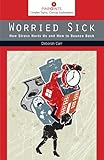Worried Sick : How Stress Hurts Us and How to Bounce Back / Deborah Carr.
Material type: TextSeries: PinpointsPublisher: New Brunswick, NJ : Rutgers University Press, [2014]Copyright date: ©2014Description: 1 online resource (124 p.) : 2 figures, 4 tablesContent type:
TextSeries: PinpointsPublisher: New Brunswick, NJ : Rutgers University Press, [2014]Copyright date: ©2014Description: 1 online resource (124 p.) : 2 figures, 4 tablesContent type: - 9780813565354
- Stress (Psychology)
- Stress management
- Stress tolerance (Psychology)
- SELF-HELP / General
- Pinpoints, Pinpoints series, Worried Sick, How Stress Hurts Us and How to Bounce Back, DEBORAH CARR, sociology, stress, stressful life, health, physical and emotional well-being, well-being, stress effects, daily hassles, ongoing strains, coping checklists, stress levels
- online - DeGruyter
| Item type | Current library | Call number | URL | Status | Notes | Barcode | |
|---|---|---|---|---|---|---|---|
 eBook
eBook
|
Biblioteca "Angelicum" Pont. Univ. S.Tommaso d'Aquino Nuvola online | online - DeGruyter (Browse shelf(Opens below)) | Online access | Not for loan (Accesso limitato) | Accesso per gli utenti autorizzati / Access for authorized users | (dgr)9780813565354 |
Frontmatter -- Contents -- 1. Introduction: What Is Stress? -- 2. Sweating the Small (and Big) Stuff: How and Why Stress Affects Our Mental Health -- 3. Under Our Skin: How and Why Stress Affects Our Physical Health -- 4. Why Some Crumble and Others Bounce Back: Risk and Resilience in the Face of Stress -- 5. Paths to Healing: Strategies for Overcoming Life’s Stressors -- Recommended Reading -- About the Author
restricted access online access with authorization star
http://purl.org/coar/access_right/c_16ec
Comments like “I’m worried sick” convey the conventional wisdom that being “stressed out” will harm our health. Thousands of academic studies reveal that stressful life events (like a job loss), ongoing strains (like burdensome caregiving duties), and even daily hassles (like traffic jams on the commute to work) affect every aspect of our physical and emotional well-being. Cutting through a sea of scientific research and theories, Worried Sick answers many questions about how stress gets under our skin, makes us sick, and how and why people cope with stress differently. Included are several standard stress and coping checklists, allowing readers to gauge their own stress levels. We have all experienced stressful times—maybe a major work deadline or relocating cross-country for a new job—when we came out unscathed, feeling not only emotionally and physically healthy, but better than we did prior to the crisis. Why do some people withstand adversity without a scratch, while others fall ill or become emotionally despondent when faced with even a seemingly minor hassle? Without oversimplifying the discussion, Deborah Carr succinctly provides readers with key themes and contemporary research on the concept of stress. Understanding individuals’ own sources of strength and vulnerability is an important step toward developing personal strategies to minimize stress and its unhealthy consequences. Yet Carr also challenges the notion that merely reducing stress in our lives will help us to stay healthy. Many of the stressors that we face in everyday life are not our problems alone; rather, they are symptoms of much larger, sweeping problems in contemporary U.S. society. To readers interested in the broad range of chronic, acute, and daily life stressors facing Americans in the twenty-first century, as well as those with interest in the many ways that our physical and emotional health is shaped by our experiences, this brief book will be an immediate and quick look at these significant issues. View a three minute video of Deborah Carr speaking about Worried Sick.
Mode of access: Internet via World Wide Web.
In English.
Description based on online resource; title from PDF title page (publisher's Web site, viewed 02. Jun 2024)


